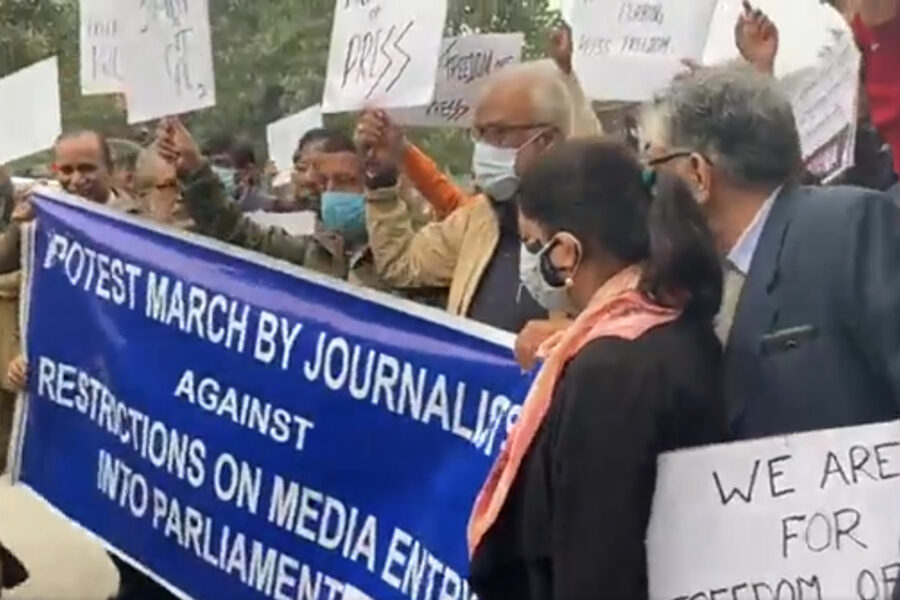Indian journalists took to the streets of New Delhi on Thursday protesting against the restrictions limiting their entry into the Parliament through a “lottery system,” calling it a “dangerous” trend.
“In the largest democracy of the world, the entry of journalists in the Parliament is regulated through ‘lottery system’. This seems to be a ploy to censor transmission of news and information to people. This is a very dangerous trend in a parliamentary democracy like India,” tweeted the Press Club of India.
On Thursday afternoon, several journalists, editors, photojournalists, writers and press correspondents, who are part of the Press Club of India, Editors Guild, Press Association, Indian Women’s Press Corps, Delhi Union of Journalists and Working News Cameraman Association, gathered at the Press Club of India premises for the protest.
Earlier, the press club had expressed its dissatisfaction with the media not being allowed to enter the Parliament to cover the first day of the Winter Session 2021 on Monday.
Noting that it marked the fifth session when “reporters have been deliberately kept out of the Press Gallery,” the press club said, “Assurances given to us were not complied with. Adding to that, is a new format of restrictions to thwart the entry of the media.”
Terming it “blatant censorship,” the press club had also shared an open letter addressed to the leaders of all political parties in the Parliament. In it, the journalists’ organisation mentioned that the press has been denied access to the Press Gallery and to parliamentarians over the past one and a half years.
Even as malls, restaurants and cinema halls have reopened, entry to the Press Gallery has been denied citing Covid protocols, the letter stated.

During the press conference held in the second week of July 2021, the Lok Sabha Speaker had assured that there would be no restrictions on media’s entry and that all permanent passes would be renewed, which was not complied with, the letter noted.
It also expressed concern that “there is a depressing trend emerging to isolate parliament and parliamentarians from media gaze” and added that this trend “augurs ill for parliamentary democracy.”
Speaking at the protest meet on Thursday, PCI president Umkant Lakhera said the Parliament becomes the hub of information and news when it is in session, and so, to restrict entry to journalists amounts to stopping the media from doing its work.
A member of the media fraternity told Al Jazeera that the number of journalists allowed inside the Parliament house has been “drastically reduced.” Under the lottery system, 60 journalists will be allowed inside the Lok Sabha and 32 in Rajya Sabha, with 11 and 10 slots, respectively, reserved for government-run and some select media organisations and agencies.
Recommended
“The present lottery system is giving no access at all to the smaller newspapers. You cannot cover parliament only by watching Sansad TV,” said editor and TV anchor Rajdeep Sardesai, referring to the government channel that telecasts parliamentary proceedings.
“It is very undemocratic what the government is doing by keeping the media out of reporting because in a parliamentary democracy the media plays a very important role,” Sanjay Kapoor, general secretary of the Editors Guild of India, told Al Jazeera.
The All India Trinamool Congress extended its solidarity to the protest, saying, “A free and robust media is the soul of a Parliamentary democracy.”
India ranks 142nd out of 180 countries in the global Press Freedom Index 2021.



